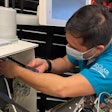A multilevel primary care intervention can improve timely follow-up of overdue abnormal cancer screening test results for several cancers, according to research published October 10 in JAMA.
A team led by Steven Atlas, MD, from Massachusetts General Hospital in Boston found that their intervention, which includes electronic health record (EHR) reminders and patient outreach with or without patient navigation, found higher rates of follow-up completion within 120 days and 240 days of enrollment for breast, lung, cervical, and colorectal cancers compared with usual care.
“We believe that such systems are best based in primary care because primary care clinicians take a ‘whole person’ approach and are responsible for a wide range of preventive health efforts including cancer screening and follow-up of test results,” Atlas told AuntMinnie.com.
Timely follow-up exams following abnormal screening results are needed to address said findings earlier. For breast cancer screening, this may include supplemental ultrasound or MRI. For lung cancer screening, additional CT imaging may be needed.
However, several barriers exist for patients to schedule and attend their follow-ups. The researchers noted that the responsibility for managing abnormal test results is “often less organized and variably falls to the performing or ordering clinician.” They also wrote that primary care clinicians often see themselves as responsible for managing the diagnostic evaluation of all abnormal test results, which adds to their overall burden.
Atlas and colleagues sought to develop and test its intervention in a primary care-based, cluster-randomized clinical trial.
For breast, cervical, and lung cancer screening results, relevant guideline recommendations and specialist input were used to create automated EHR algorithms to identify eligible patients and determine the recommended diagnostic follow-up and the appropriate time interval. For short-interval colonoscopy results, the follow-up period was determined by the gastrointestinal specialist performing the procedure.
After enrollment, patients in the intervention arms had screening reminders added to the EHR identifying the type of abnormal result and recommended follow-up. Patients and clinicians could view these EHR reminders any time the record was accessed, most commonly around the time of an office encounter. Completing the recommended follow-up led to closure of the EHR reminder.
Patients in the two outreach intervention arms received a reminder letter. Those remaining overdue were given a reminder phone call that was made by study staff. Patients in the intervention arm that included patient navigation were called to assess social barriers to care such as family caregiving, transportation, and financial costs of tests and treatments. Navigators used an online network of verified social service programs to help connect patients with services available in their community.
The team included 11,980 patients with a median age of 60 years in its study. The patients had an abnormal cancer screening test result for colorectal cancer, cancer, breast, and lung cancers.
The researchers found that the interventions led to significant improvements in timely follow-up completion within 120 days and 240 days.
| Adjusted completion rates of interventions, usual care |
||
|---|---|---|
| |
120 days |
240 days |
| Usual care |
22.9% |
34.1% |
| EHR reminders |
22.7% |
34.7% |
| EHR reminders and outreach |
31% |
42.6% |
| EHR reminders, outreach, and patient navigation |
31.4% |
43.8% |
Atlas told AuntMinnie.com that implementing these findings requires healthcare networks to invest in the information technology infrastructure and coordinate outreach efforts among the primary-care clinicians and specialists, such as radiologists, who are involved in cancer screening and abnormal result follow-up.
He added that despite the success of the interventions, there continue to be large gaps in care that need addressing if the full benefits of preventive cancer screening are to be realized.
“We are discussing these findings with our network and hope to implement such systems and outreach efforts as a new standard of care,” he said.
The full study can be found here.



















